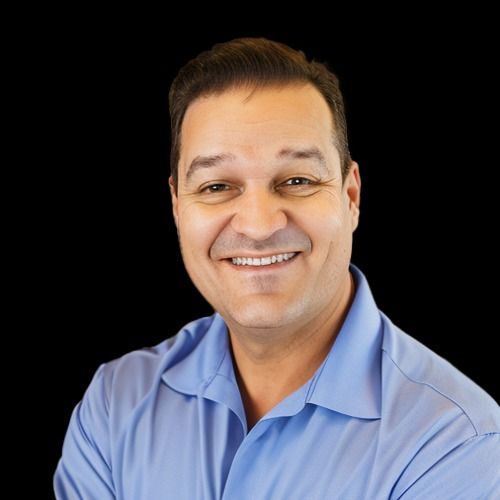Episode 138
Key Takeaways from Creating Wealth by Robert G. Allen
In this episode of our book review series, join me as I delves into the transformative insights of Robert G. Allen's "Creating Wealth." Discover how this influential book, authored by the real estate and wealth-building pioneer, lays the foundation for a wealth mindset, the power of leverage, and the significance of multiple income streams. Let's explore the wisdom of negotiating effectively, understanding financing and loans, and seizing opportunities in foreclosures and tax liens. Learn the art of networking and team building, while also gaining valuable insights into risk management and the importance of continual learning and adaptation in the ever-changing world of wealth creation. Tune in to uncover the timeless principles that can supercharge your journey to financial freedom.
About Jeff:
Jeff spent the early part of his career working for others. Jeff had started 5 businesses that failed before he had his first success. Since that time he has learned the principles of a successful business and has been able to build and grow multiple seven-figure businesses. Jeff lives in the Austin area and is actively working in his community and supporting the growth of small businesses. He is a board member of the Incubator.Edu program at Vista Ridge High School and is on the board of directors of the Leander Educational Excellence Foundation
Connect with the Freedom Nation podcast at https://freedom-nation-podcast.captivate.fm/
Connect with Jeff:
Instagram: https://www.instagram.com/freedomnationpodcast/
Twitter: https://twitter.com/JeffKikel
LinkedIn: https://www.linkedin.com/in/jeffkikel/
Thanks for listening!
Thanks so much for listening to our podcast! If you enjoyed this episode and think that others could benefit from listening, please share it using the social media buttons on this page.
Do you have some feedback or questions about this episode? Leave a comment in the section below!
Subscribe to the podcast
If you would like to get automatic updates of new podcast episodes, you can subscribe to the podcast on Apple Podcasts or Stitcher. You can also subscribe in your favorite podcast app.
Leave us an Apple Podcasts review
Ratings and reviews from our listeners are extremely valuable to us and greatly appreciated. They help our podcast rank higher on Apple Podcasts, which exposes our show to more awesome listeners like you. If you have a minute, please leave an honest review on Apple Podcasts.
Transcript
FN Intro/Outro: Welcome to the Freedom Nation podcast with Jeff Kikel. On this show, Jeff shares his expertise in financial and retirement planning from a different perspective, planning for your Freedom Day, which is the first day that you wake up and have enough income or assets and do not have to go to work that day. Learn how to calculate what you need, how to generate income sources, and listen to interviews from others who've done it themselves, get ready to experience your own Freedom Day.
Jeff Kikel:Hey, everybody, it's Jeff, once again with another episode of our book series, or book review series on the top 10 books that helped me achieve my Freedom Day. So today, it's number five on that list. And the book is creating wealth by Robert T. Allen. So this book, was one of the probably the third or fourth book I read from Robert Allen, Robert Allen, if you don't know who he is, is one of the guys that kind of created the No Money Down systems for when I was growing up. He had the Carlton sheets, guys and all those guys that did the infomercials on TV, but most of them got their concepts from Robert Allen in the seminars he had been doing all around the country. He wrote a book called Creating wealth a little bit later on, it was probably his fourth or fifth book. And this book, I think, for me, it helped to get my mind around creating wealth and some of the processes and things that I needed to think about when it came to creating wealth. So inside the book are some key concepts, just like I've talked on some of these other reviews, I'll talk about some of the key concepts from the book, and why you'd want to read this. The first concept is wealth mindset. And I think above all else, very much like, what came out of thinking grow rich with Napoleon Hill, building a mindset that you set goals, you believe in yourself, you are open to opportunities, is going to build a wealth mindset. It's going to stop thinking like an employee of what can I do to get a paycheck? And start thinking about how can I achieve my goals? How can I pay for those goals by building a business or whatever it takes, talks about the power of leverage using the leverage the tool of leverage to build wealth. Now, not just financial leverage in real estate and other things, but also leveraging others expertise, and knowledge that you can use to rapidly move yourself beyond. This is where I think the power of a good mentor comes in. Being able to use somebody who's already been there use their knowledge, who's willing to share that knowledge with you. Real estate investing, no surprise here, that real estate investing is one of the greatest ways to build wealth, to build passive income to build cash flow. Real estate is and that is one of the ways that you know, Robert made money over the years, or Bob made money over the years, was in real estate, and still continues to do that, to this day. It is one of the key concepts of the Freedom Day method as well, because I believe it is the way that you can build some of the greatest wealth in the world by holding profit. So one of the things that the book promotes is buy and hold instead of flipping properties. If you're flipping properties, or you're doing wholesaling, it's not a good long term thing to do. Because you're always going you never get to stop, you never reach a point where you can stop, it's all active income. And if you don't continue to do it, you don't have money coming in. So buy and hold and profit from that. Now I am of the belief, I don't tend to hold real estate for long periods of time, I typically hold it for five to maybe seven years at the most, mainly because I've either bought something that was in really good shape, or that I've rehabbed something. And by the time five to seven years gets there, it's starting to show its where and I don't want to have to put more money into a property at that point. So I typically will sell those properties and move on to another property using tax advantage deals like 1031 exchanges to be able to do that without incurring taxes, multiple streams of income and I thought this was extraordinarily important. And one of the things that you know, Bob talks about a lot is multiple streams of income other ways, diversifying, you know, and they don't have to all be making hundreds of 1000s of dollars a year, an extra couple $1,000 A month here and there. makes a big difference over time. And if you can band a whole bunch of that together, this actually can work immensely well for you in the long run, because if one stream goes away, you're not limited, you're not stuck, you have other ways of making money. The power of negotiation is another key concept of this. And it is a key concept in real estate business. Whatever you do, it should be something that is studied and understood. Even dealing with your own kids, you have to negotiate with them. And sometimes dealing with kids is worse than dealing with a terrorist. So you need to understand the power of negotiation and how to be successful with that. Understanding, financing and loans is another amazing thing. One of the key things that I've learned and will be part of another book that I review down the world or down the way, it's really understanding how financing and loans work, so that you can band together and put things together, be creative, and financing so that you can get more deals done. Investing in foreclosures is one of the big things that Robert talks about in this book. It's an area that I haven't done a ton of, but it is on the list of things that I would look at down the road. But foreclosures many people have made a lot of money investing in foreclosures. And I would foresee with where we are in the financial cycle, where we are in the business cycle, it is very likely at some point in the very near future, we will see more and more foreclosures popping up. So being aware of this, being prepared is a perfect opportunity for people that don't want to have the responsibility of managing portfolios of rental properties. Another option are tax liens and tax deeds. What these are, is basically somebody hasn't pay their property taxes, the you know, the county that they live in, still needs to pay their bills, they still need to run things for the county. And so what they do is they sell off the tax liens or tax deeds for properties that are behind in their taxes. So an investor comes in, they basically pay the taxes for that person, and then they own a deed or a lien on that property. And if the person doesn't pay, at some point in the future, that property could default back to them. As the tax lien or the tax deed audit, most often people end up paying their taxes. I'll give you an example here in Texas, if you if you know if you default on your taxes and then come back and pay them, there's a 25% penalty, well, that 25% penalty goes to the investor that is paid for the taxes for that. So it's a great, very high return strategy, that is very low risk, in the end, you've just got to do, you've got to understand it. And you've got to do a little bit of work there. And you've got to have a little bit of capital to get started, which there are lots of ways to do that. Networking and team building is another key part of this. And I think more important than anything, when you're starting to build a real estate portfolio, really any kind of business or anything you're doing. You need to network and build a team of people around you. And these are not necessarily people that work with you, or work for you. There are people that are allied businesses to yours, that you can leverage to help you to achieve what you need to do. And building that team that works together is a key concept to really being successful. Risk management, I think in this book is an absolute key because too many people that are using leverage can take too much risk, and not really look at all the risks associated with real estate and other investments. So understanding risk management, what can happen if you do certain things. The last thing and this is a key concept of several different books that I've reviewed with you already, is continual learning and adaptation. You've got to continue to learn, you've got to continue to amass knowledge over time. And that knowledge should be used to be adaptable to what's going on. The markets aren't going to stay exactly the same as they are today. They're going to change the economy changes. The world changes. We got multitudes of things from the stock market to the real estate market, all of that is changing and we have to be able to adapt, and the only way you can adapt is to continually increase the body of knowledge in your head. So once again, a well written and actually very enjoyable book to read. I would highly encourage you to read creating wealth from Robert G. Allen. And really a lot of his other books. They're fantastic. A lot of them are a little bit older, but most of the concepts are Still key concepts today. But I would encourage you to read anything that he writes because I literally have a whole shelf of his books in my house and I will keep buying whatever he has, because it's just great information. So thanks. Make sure you subscribe to the channel, hit that little notification button, so that when we post these things, you're gonna see them every time. Thanks for being on here and we will see you back here the very next time.
Jeff Kikel:FN Intro/Outro: Thank you for listening to the Freedom Nation podcast. You can find us on Apple podcasts and all the major channels wherever you're listening. Please subscribe to the channel and leave a rating and review. If you have friends and family that could benefit from their own Freedom Day. Please share with them finally, join freedom nation by following us on Facebook, Instagram and Twitter.


